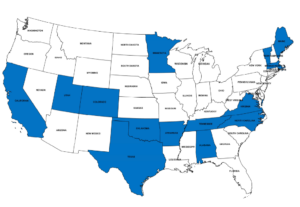Make no mistake, Super Tuesday is a significant Election Day: 14 state contests in four different time zones that involve selection of a about third of all Democratic delegates. As a guide for these contests, JMC has some “big picture” thoughts, broken out by time zone (map of these contests shown below):
In the Eastern Time Zone are the contests of Maine, Massachusetts, North Carolina, Vermont, and Virginia. These five contests are arguably the most important of the 14 contests for the following reasons:
-
- Since polls close for these contests as voting is still occurring in the other time zones, any “blowouts” could impact voter psychology in remaining nine contests outside of the Eastern Time Zone;
- The electoral performance of Elizabeth Warren’s campaign in the first four contests has made her somewhat of an after thought. As such, a loss to Bernie Sanders in her home state of Massachusetts would likely send her campaign into an irreparable death spiral, since she has not been able to compete with Bernie Sanders in the ”progressive swim lane” – or any other “swim lane”, for that matter;
- While Joe Biden’s win in South Carolina was a crucial victory that essentially cleared the “moderate swim lane” for him thanks to the Klobuchar and Buttigieg withdrawals in rapid succession, he nevertheless has to show strength among more diverse electorates like those in the North Carolina and Virginia contests;
- Michael Bloomberg will finally be put to the electoral test: while Bernie Sanders is likely to win the New England contests in Maine, Massachusetts, and Vermont, it is crucial for Bloomberg to piece together enough moderate Democrats and/or minorities to defeat Biden in North Carolina and/or Virginia. Especially since North Carolina/Virginia’s size is more conducive to the saturation style media campaign he has been waging;
- Given the early vote in North Carolina, the Biden vote may be diluted by those who voted for Buttigieg or Klobuchar before they withdrew from the race;
In the Central Time Zone are the contests of Alabama, Arkansas, Minnesota, Oklahoma, Tennessee, and Texas
-
- In Minnesota, can Klobuchar’s vote transfer to Biden (who she endorsed upon withdrawing from the race)? A victory there would be a shot in the arm for the Biden campaign, although Minnesota does have a strong liberal contingent in the “Twin Cities” of Minneapolis and Saint Paul. So a Sanders win would not (in the opinion of the author) be particularly surprising, even if the resulting political perception value would be bad for Biden;
- Alabama has the highest black population of the states in this time zone. Combine that with the fact that there is a robust GOP Senate contest going on at the same time, and you have a Democratic electorate that will likely be “majority minority”, and Biden (like South Carolina) therefore needs a very strong showing there;
- Similarly, in Arkansas and Tennessee, the black electorate is more moderate sized, so Biden needs white southern Democratic support in states like these as well. And in Arkansas, Republican primaries for Congressional races will drain quite a bit of the white/more conservative vote away;
- Texas is the “prize” of the Central Time Zone, and assuming that Bernie does well with urban liberals (in places like Dallas, Houston, and Austin) as well as the Hispanic vote, he should clinch a victory. If Bloomberg wants to show any viability on Super Tuesday, he HAS to do well here;
- Early voting will also be a big deal in Tennessee and Texas, with a similar complication of the Buttigieg or Klobuchar vote that was cast before their withdrawals that could have gone to Biden;
In the Mountain Time Zone are Colorado and Utah
-
- Bernie is likely to win both contests, as the Democratic electorate in both states is liberal. One small wrinkle: given that both states have heavy mail in voting, there may be a delay in getting a complete count there on Election Night, so those two contests may not be “called” tomorrow night depending on the margin by which Sanders is leading there;
California is the only state voting in the Pacific Time Zone. Which means no results will be reported until 10PM Central/11PM Eastern time zone. This primary contest will be the most interesting (or agonizing) for the following reasons:
-
- Sanders will likely do well here because of the white liberal contingent as well as the substantial Hispanic population;
- There will be all kinds of misinformation about the turnout being “low”, which invariably ends up being untrue. Why ? Because not only does California have a robust “vote by mail” tradition in recent election cycles, but with 59% of that vote in the 2016 primary being cast that way, mail in ballots take time to count. Furthermore, in California, a mail in ballot can be postmarked as late Election Day and still be counted. This means that the determination of the “voter universe” will not be finalized until several days AFTER Election Day, after which it takes a month to count these votes;
- There is another wrinkle to the California counting: 3.6 million votes have already been cast early, with the vast majority of that being cast before the Klobuchar, Buttigieg, and Steyer withdrawals. And before Biden clinched a crucial win in South Carolina. So it’s possible that the early results are more tilted towards the withdrawn candidates and/or Michael Bloomberg, who was riding high until his debate performances.

